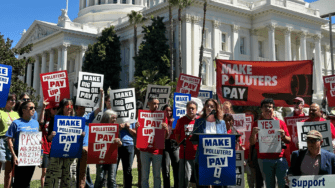California Climate Lobby Day Resources
In the face of federal attacks on climate progress, California must lead with bold, science-driven climate action that protects our environment, supports marginalized communities, and creates a healthy, thriving economy for all. See below for more information on critical climate policies California must advance in 2025.
The Make Polluters Pay Climate Superfund Act – AB 1243 (Addis) and SB 684 (Menjivar)
The Make Polluters Pay Climate Superfund Act — AB 1243 (Addis) and SB 684 (Menjivar) — identifies and assesses a fee on the world’s largest fossil fuel polluters. The fee will be proportional to their emissions since 1990, which is decades after their own scientists warned them of the dire consequences their products would inflict on humanity.
This bill will direct the California Environmental Protection Agency (CalEPA) to complete a climate cost study of total damages to the state through 2045 caused by fossil fuel emissions. The agency will identify responsible parties and assess compensatory fees on the largest fossil fuel polluters. The fees collected will fund projects and programs to mitigate climate disasters and remedy or prevent climate-related costs and harms. This bill prioritizes labor and job standards and dedicates at least 40 percent of the funds to benefit disadvantaged communities.
Contacts: Woody Hastings, 310-968-2757, woody@theclimatecenter.org; Fatima Iqbal-Zubair, 201-841-5949, fatima@envirovoters.org
Virtual Power Plants – AB 740 (Harabedian)
AB 740 (Harabedian) will accelerate the use of virtual power plants (VPPs), which are networks of clean, distributed energy resources like smart thermostats, home batteries, smart plugs, electric water heaters, and electric vehicles. When aggregated, these resources can deliver energy during peak demand hours, creating savings for the VPP participants and for all electricity customers by avoiding reliance on the strained electrical grid. AB 740 would require the California Energy Commission to include virtual power plants in its modeling of energy supplies and adopt a strategy to enable virtual power plants to be deployed at scale.
A recent Brattle Group study found that VPPs could save Californians $550 million per year, $50 million of which would flow directly to ratepayers. VPPs can help reduce costs for all ratepayers by reducing the need to build poles and wires to accommodate growing electricity demand.
Contact: Kurt Johnson, kurt@theclimatecenter.org, 970-729-5051
Expanding Small and Medium Composting Operations – SB 279 (McNerney)
SB 279 (McNerney) would expand composting capacity on farms and in communities, divert more food scraps from landfills, and provide California growers with a climate-friendly alternative to open burning. Composting creates healthy soils that draw carbon out of the atmosphere, retain water, and increase food security. It also reduces climate pollution by preventing methane emissions.
This bill would allow growers to compost their agricultural waste onsite, keeping critical nutrients on the land and reducing the need to haul or burn the scraps. The bill will also increase community composting capacity from 100 cubic yards to 500 cubic yards, allowing operations like urban farms and school farms to recycle more of their organic material onsite. SB 279 also incentivizes composting food waste at medium-size composting facilities and allows composting operations to sell or give away up to 5,000 cubic yards of compost a year.
Contact: Baani Behniwal, baani@theclimatecenter.org
Reforming Cap and Trade – AB 1207 (Irwin) and SB 840 (Limón)
California’s Cap and Trade program is supposed to be one of the most effective tools the state has for both reducing climate pollution and generating funds to invest in climate solutions. But as it’s currently structured, the program gives Big Oil far too much license to continue polluting, especially in frontline communities. Oil and gas corporations receive an estimated $1 billion in giveaways through Cap and Trade every year, called “free allowances.” In 2025, California has the opportunity to reauthorize and reform the Cap and Trade program to eliminate free allowances for fossil fuel corporations, increase revenue for the Greenhouse Gas Reduction Fund (GGRF), and provide rebates to working-class Californians to offset rising energy costs.
Coalition letter to California state leaders re. Cap and Trade program, April 10, 2025
Contact: Barry Vesser, barry@theclimatecenter.org




